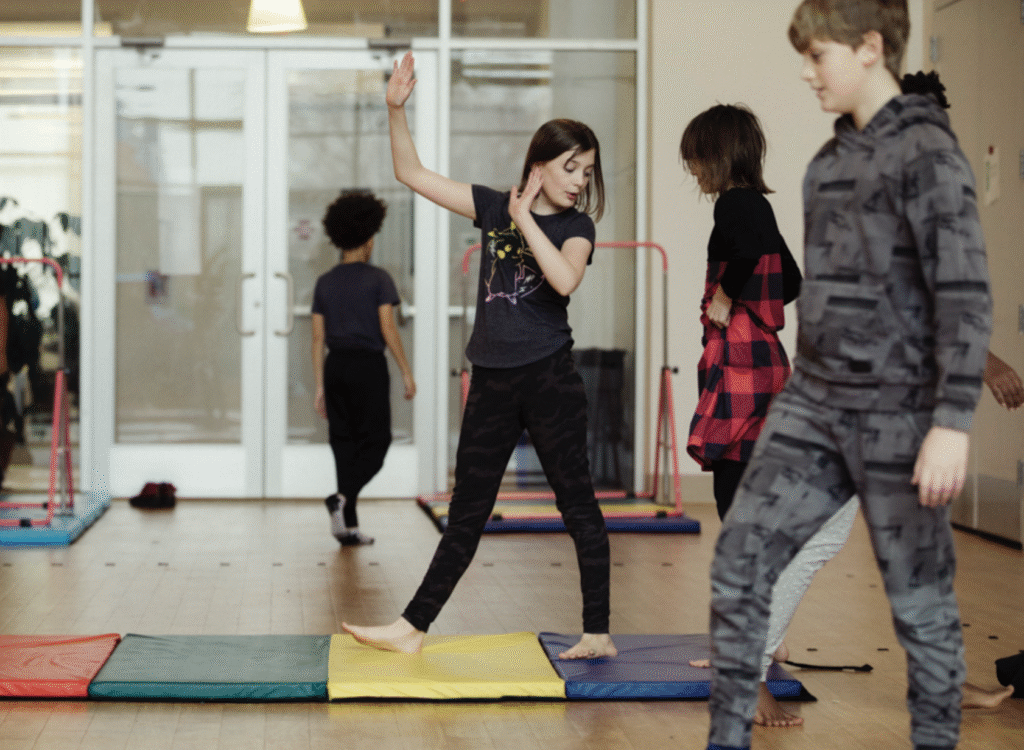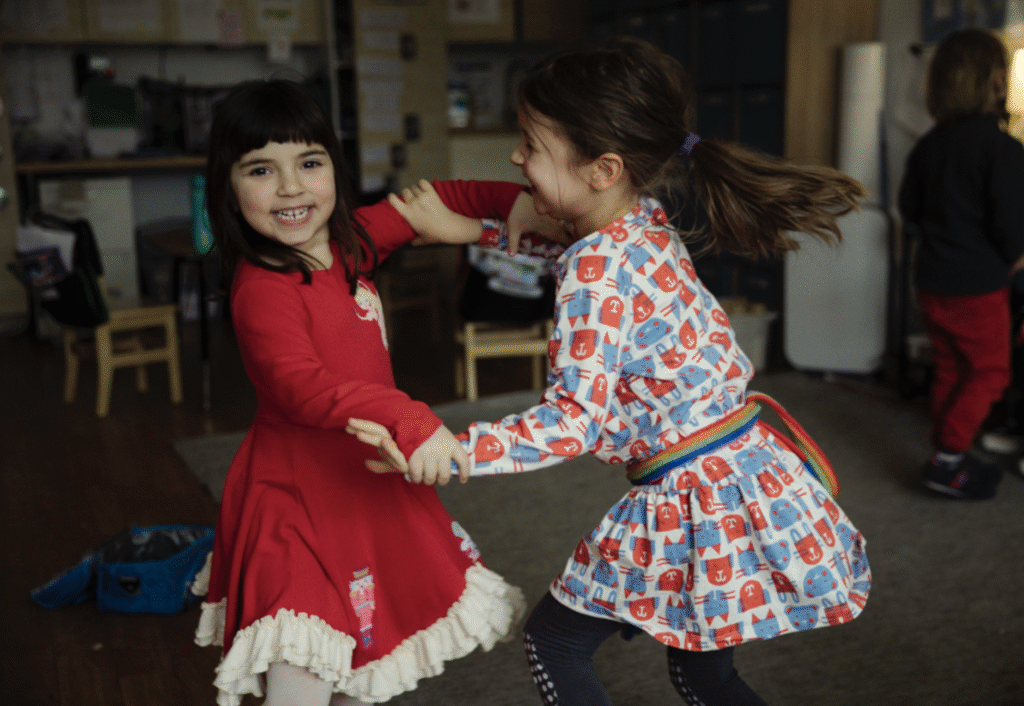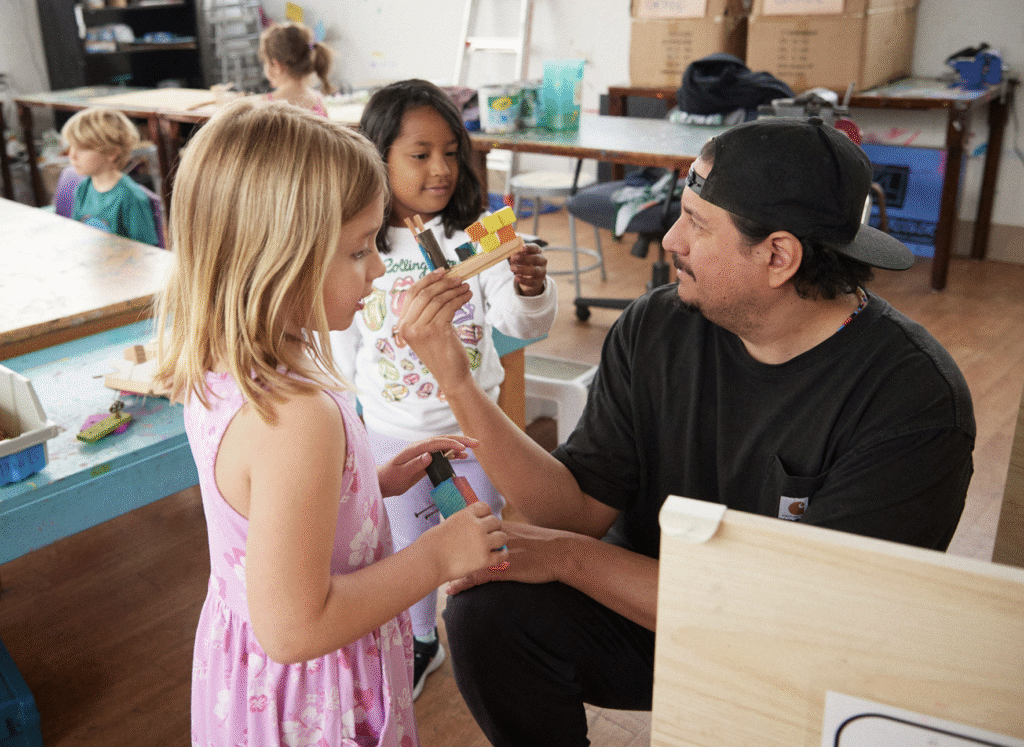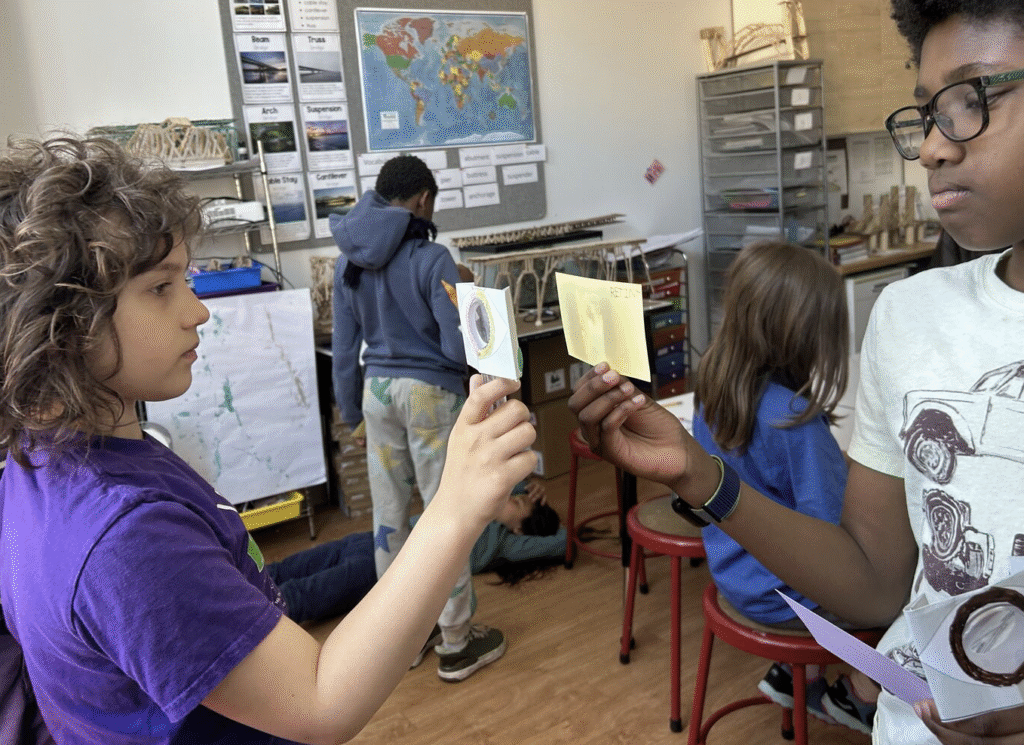Academics
Lower School
Our approach to teaching Kindergarten through Fourth grade is firmly rooted in our philosophy that students thrive when they are invested in finding answers to their own questions. Our teachers use the Responsive Classrooms Approach to teaching and classroom management, which is student-centered and focused on social and emotional learning. Our classroom communities are joyful, energizing, and safe for students to discover themselves and grow.
Responsive Classroom
Inquiry Based Learning
Social Emotional Learning
Curriculum and Details about our Lower School Program
Students read and write in a variety of genres each year, both independently and in partnerships and groups. Beginning in the earliest years, teachers introduce and model a skill, like looking for clues about reading dialogue with expression. Students work together in small groups and then gather as a whole class to reflect on what they’ve learned. New literacy skills and challenges build on earlier ones, and students expand their vocabulary, grammar, and background knowledge as they read and write. Our use of the Fundations curriculum ensures students are not left behind in critical decoding and phonological skills. Teachers employ methodology from the science of reading, including The Writing Revolution, Morpheme Magic, Heggerty, and others.
At the Co-op School, math means:
– Learning concepts through inquiry, essential understandings, and exploration and thinking.
– Problem-solving by connecting literacy skills and context.
– Valuing process separate from content in which students are demonstrating and articulating how they engage with mathematics.
– Highlighting growth over performance.
– Providing differentiation to support, nurture, and enrich our students.
We focus on four tenets to deliver thoughtful and effective instruction:
– Math and Inquiry – Workshop model structures supporting exploration, focus use of essential questions in EnVision Math & unit plans to guide inquiry and support thinking. Develop essential understandings as a result of student exploration throughout each unit and summarized in lesson shares.
– Math and Literacy – Focus on literacy skills and reading comprehension in mathematics. Use of Exemplars and dedicated problem-solving period (30-minute per week) to teach these connections.
– Math and Process – Focus on students showing mathematical thinking through the five-process standards, Use of Exemplars and the Exemplars rubric in particular.
– Math and Differentiation – Dedicated time for small tiered groups, small group tier 2 & 3 instruction, enrichment, extensions and practice for tier 1 and high tier 2 students.
These studies are the core of our classroom activities. Each grade-level class takes an in-depth look into a particular topic or period of history. Walking our halls, you’ll see classrooms adorned with student artwork, writing, and projects related to that year’s study, as if you are visiting a museum with exhibits or stepping through time.
Innate curiosity is expressed purposefully as students read, construct, research, interview, and create in various mediums. Students pursue their projects in the real world, through trips, guest speakers, and lively conversations. Through it all, teachers balance support with observation. They step back, listen, and document student ideas and questions, as well as push students further with probing questions and introducing new artifacts. Amazingly, the studies each year are designed to build upon one another so that students can draw on knowledge attained in previous years’ studies. Some studies change but others remain, offering opportunities for older and younger students to share in learning and building community.
These units offer a great deal of freedom and choice to students, but behind the scenes are carefully planned to align with state standards.
Early world language instruction builds verbal and social skills and fosters an interest in different cultures, so we include Spanish instruction in the curriculum for all Kindergarten to Fourth-grade students. Students engage with the language through conversation, storytelling, music, and games. They learn to communicate basic concepts and develop a cultural understanding of Spanish-speaking countries; first verbally, and then in writing. Beginning in 5th grade, students receive more consistent and formalized Spanish instruction three or more times a week.
The goal of our Spanish Program is to expose children to a second language and to various cultures, while fostering an interest and appreciation of the Spanish language. We teach the children through conversation, storytelling, music and games.
Technology is an important tool for learning, research and communication. Technology supports our approach to education by incorporating carefully curated learning tools and increasing research skills while differentiating instruction for the needs of each child. Technology can extend project work with virtual field trips and educational videos. Beginning in Third Grade, the children begin to learn keyboarding skills with our Chromebooks. They learn about video creation for culminations, Google Docs and The Cloud. They write stories on Google Docs and share them with their peers and teachers. These skills continue on in Third, Fourth and Fifth Grades, where they develop further as they begin to use online search engines to support research, learn how to find reliable websites, what cyberbullying is, coding and how to edit/peer edit their work. Classroom projectors show and share visuals, images, videos and documents.
The school day begins with drop-off followed by a morning meeting where students greet one another, read their morning message, discuss their schedule for the day and build trust and connection with activities and discussion. Academic and specials periods happen at different times each day. Daily recess is held on our rooftop playground. A closing circle occurs just before dismissal, where they reflect on their day together.
The Co-op School believes that reading should be a habit and a pleasure. Students spend a minimum of 20 minutes reading just-right books independently each night. For some children, teachers may also recommend short periods of additional study in targeted subjects. For example, families of Kindergarten through 3rd-grade students will regularly receive some activities that children can work on at home to reinforce reading and writing skills. Students in second and third grades may benefit from additional time spent using IXL, an online platform for practicing math skills. 4th graders begin to receive homework more regularly to prepare them for middle school and high school and practice accountability for materials that travel to and from school. Parents support and encourage students by creating time and space at home to use these resources.
We believe that it is important to consider the whole student throughout the assessment process. A test can provide a “snapshot” view of the moment, it doesn’t show the student’s whole set of strengths and abilities. However, assessments do help us chart student progress over time, pinpoint specific areas of strength and growth, and make needed changes to curricula. Standardized test results are considered as one piece of data along with other performance evaluations, including teacher-made tests, projects, and creative assessments.
The Co-op School uses Northwestern Evaluation Association (NWEA) MAP Growth as a part of our assessment process starting in third grade. This adaptive web-based standardized assessment measures growth and proficiency. MAP is used in addition to other formal and informal assessments that take place in the classroom.
Students are screened three times a year with the DIBELs literacy assessment.
Students engage with their community and make social connections through student council, drama, and health class, as well as overnight trips. Our extensive range of after-school enrichment offers optional activities from the competitive inter-school basketball team, to photography and more. And, families and students participate in a host of annual community events—from the Book Fair, Field Day, School Values celebrations, and a Community Potluck.
Specialized Classes
Specialized Classes are essential to a well-rounded Lower School experience, which is why we provide our students with daily opportunities to explore movement, art, music, science, gardening, library, and hands-on activities. These experiences nurture curiosity, creativity, and a love of learning that support their growth across all areas.
Movement
Our Movement Special gives students an energetic, age-appropriate experience that builds confidence, teamwork, and physical skills through games, creative activities, and choreographed movement, while also teaching safety, respect, and body awareness. Classes take place in our multipurpose room or at nearby Raymond Bush Park, where students explore fitness, health, and the importance of cooperation.

Music
In Lower and Middle School, students engage in structured music instruction twice a week. They explore a variety of musical genres including folk, contemporary, and classic songs, while also participating in movement activities. Students are encouraged to unleash their creativity by composing their own songs and even crafting musical instruments. Song selections are often aligned with class projects and occasionally co-created by the students themselves.

Arts and Creative Making
Fostering self-expression and creativity is a significant aspect of our ethos, and each classroom utilizes various mediums such as painting, drawing, clay, collage, construction, block building, cooking, and woodworking. Through these experiences, we encourage every child to actively engage in the creative process. We instill qualities like perseverance and problem-solving by urging them to explore alternatives and approach creation in novel ways. Most importantly, we emphasize to them that many ideas yield outcomes different from their initial expectations. Ultimately, the products of our creative efforts reflect the dedication and ongoing process involved.

Science
Science is a window onto the world that excites even our youngest learners. During our Science Specials, we encourage our students to be curious, experiment and explore. Through experimentation, our students are introduced to higher learning concepts while developing reasoning skills, problem-solving, and learning to ask questions about the world around them. In Lower and Middle School, students have access to The Co-op School’s own standards-based science curriculum, which incorporates the acclaimed Amplify Science materials. Lower School science education harnesses children’s curiosity about the natural world, building their base of knowledge through discovery and experimentation as well as through research.


